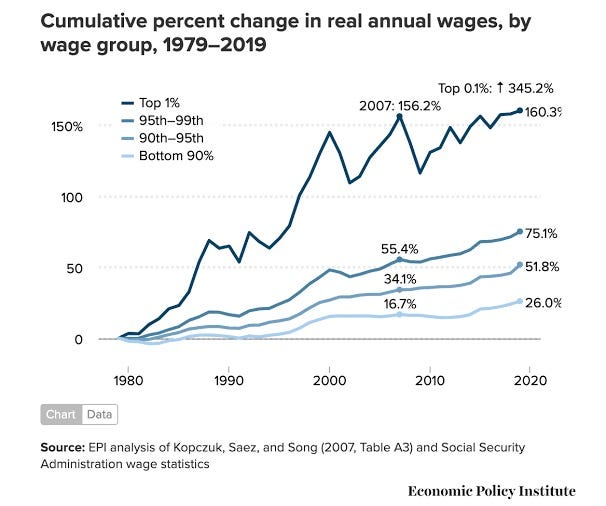Saving money? The best budgeters recommend cutting the biggest expenses first.
I have several facts to present.
The earnings gap between management and workers, and particularly between CEOs and workers, has been diverging dramatically since the 80s.

The public sector (nearly) matches the pay rate of the private sector for managerial positions “in order to attract sufficient talent”.
The private sector sets the payrates of managerial staff and other workers via the decisions of the managerial staff. This means people in management positions are not only setting their own rates, they are setting the rates for the staff working under them.
The managerial class have also been in charge of layoffs and redundancies. Notably, Nicola Willis had to intervene due to concerns the public service would be “top heavy”.
Our politicians come from the managerial class, including the likes of Christopher Luxon and Simeon Brown.
In 2023, Luxon promised he would donate his pay rise to charity to belay criticism that he would be cutting the public service while paying himself more. I have been unable to ascertain whether this has been done via enquiries to his office, leading me to conclude that it likely has not.
This money we are giving the top executives of corporations and government bodies should rightfully be going elsewhere, but it isn’t, and this exists all along the corporate chain. The steep pyramid structure of a corporation takes dollars out of the paychecks of those beneath them. A CEO can cost 50x that of a regular worker, which means the positions below CEO must cost 40x, and below that 25x. Cutting a CEO’s pay to 10x that of an average worker, and their underlings to 9x, and their underlings to 8x creates exponential savings at the top which can be used to even out the incomes at the bottom.
There were a lot of questions bandied around about where our new defence spend might be coming from. Yesterday, the government announced more than $2 Billion would be spent on maritime helicopters. The government have today announced that billions will be saved by changing pay equity laws to avoid the government having to pay out women-dominated industries for decades of pay disparity between them and their male-dominated counterparts. One can only conclude these matching billions are related.
The government won’t be paying for these promises. Women will be. And also men, in women-dominated fields who today receive notably less pay than other equivalent professionals because of historic underpay.
I know a better place to find this money.




So do I. I know a better place to start with pay cuts too.
Faaaaaàrrrrrrrrrrkkk😳